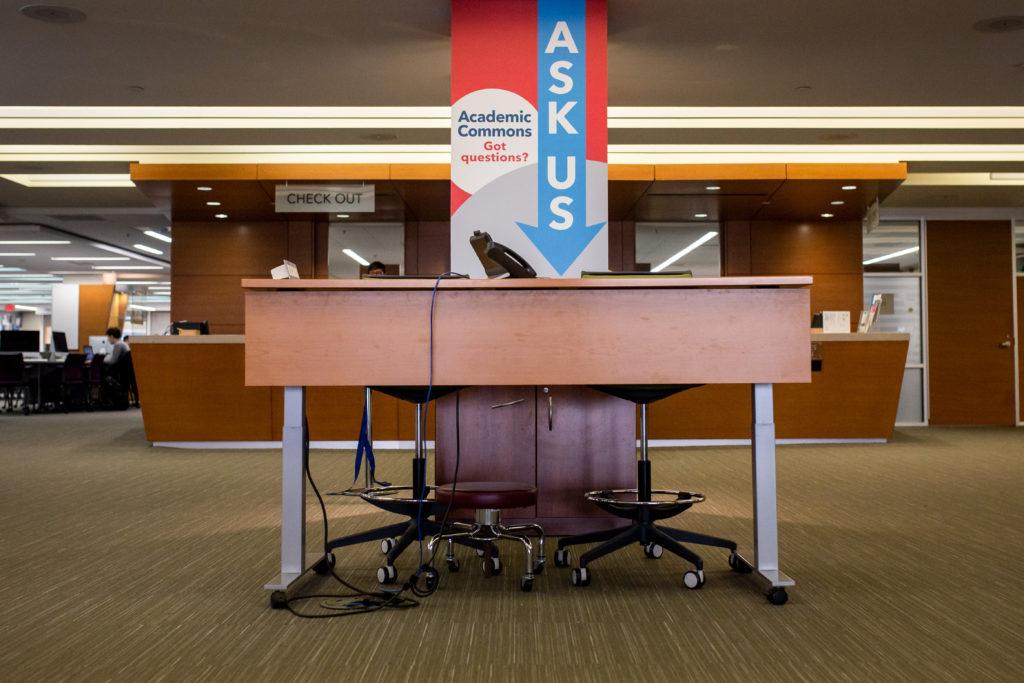Students are increasingly asking their peers for academic help.
About 1,100 students requested help from the University’s peer coaching service last academic year, submitting a total of roughly 3,000 requests, according to a winter library report.More than 2,000 requests have been submitted for peer assistance so far this year, officials said.
Administrators said the University has expanded its peer coaching service since debuting Academic Commons at the start of the fall semester. On top of offering peer assistance, officials also hosted about 450 course review sessions, Geneva Henry, the dean of libraries and academic innovation, said.
Henry said Introductory Biology: Cells and Molecules, Finite Mathematics for the Social and Management Sciences, and Principles of Mathematics for Economics I were the courses students requested assistance in most often during the fall semester. Academic Commons also provided on-site support or campus referrals for 88 different courses, she said.
The University began tracking peer coaching requests last year when officials centralized tutoring services for science and math subjects in the STEMworks lab. Since launching Academic Commons, the University has expanded its tutoring services beyond STEM fields, Henry said.
“Based on user feedback, we’re providing a much clearer way of searching for and locating peer-assisted learning opportunities on our website,” Henry said in an email. “We also found that many students are unclear about the term ‘peer coaching’ so we will be using ‘peer tutoring’ in the future,” Henry said.
She declined to say why peer coaching is a priority for the library and how the library accommodates high demand for tutoring in subjects like economics. She also declined to say if the library has changed the number of coaches available to students over the past several years and how many peer coaches the library currently employs.
Kes Schorer, the director of Academic Commons, said in the library’s winter report that peer coaching is in “great demand” at the library. About 82 percent of requests in the 2017-18 academic year were for introductory-level courses in subjects like biology, mathematics and economics, according to the report.
Schroer said faculty are recommending peer coaching services to students around campus. Forty-five faculty in the biology, economics and mathematics departments did not return multiple requests for comment or deferred to officials in Academic Commons.
“Peer coaching is often a powerful mechanism for helping students boost academic skills,” Schroer said in the report. “We are building a supportive community that helps students to succeed at GW and beyond.”
Nicole Cannizzaro, the assistant director of tutoring and program development at American University, said peer coaching is mutually beneficial for students and coaches because there is an immediate connection and peer coaches are paid by the hour for their work.
“There is research that peer coaching is more effective than professional coaching and students are pretty awesome – they always exceed your expectations,” she said.
Christie Kahil, the assistant director of the academic learning and tutoring center at Tulane University, said high requests for peer tutoring in introductory courses is typical because there are likely students who need help adjusting to college coursework.
“A lot of these entry-level courses are very large, which reduces the amount of time and attention that you get from a professor, and that can be a big change,” Kahil said.
Kahil added that building up peer tutoring programs can help students perform well in their courses since they have access to a free support service.
“Everyone learns in different ways, and professors certainly don’t often teach in different ways to accommodate every student,” she said. “Peer education programs allow students who don’t learn a certain way to be successful.”
Vita Fellig contributed reporting.





